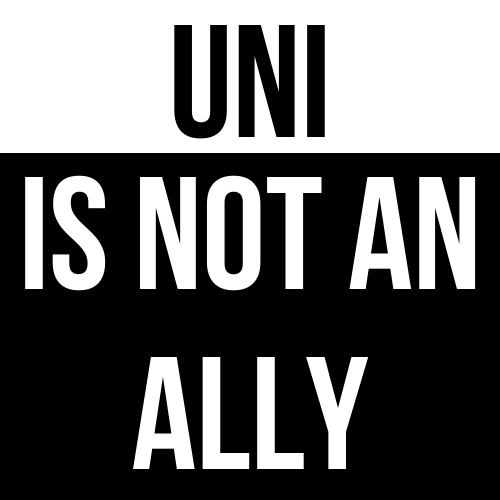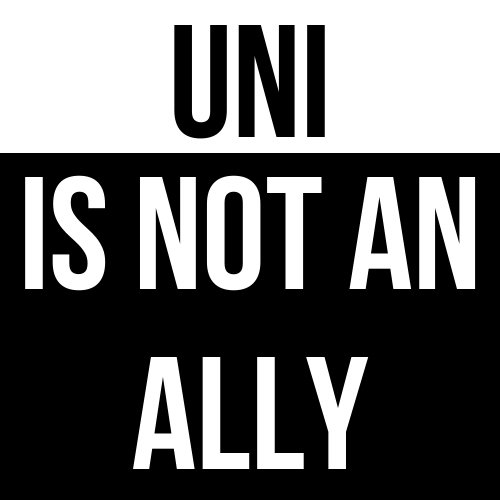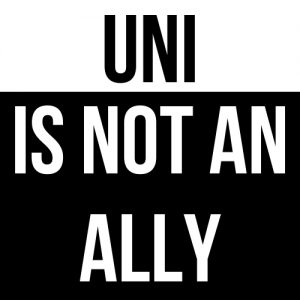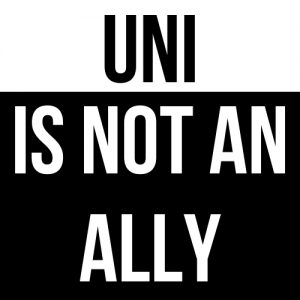REC launches #UNIisnotanAlly campaign
Nov 4, 2019
Following President Nook’s Oct. 30 email to campus regarding the concerns of the UNI Racial and Ethnic Coalition (REC), members of REC have launched a social media campaign titled #UNIisnotanAlly.
“In view of the fact that UNI has chosen community engagement and diversity and inclusion as some of its important pillars, we feel like they haven’t upheld that,” said REC member Mahlia Brown, senior psychology major. “UNI is not being an ally to students of color. They say they are, but to be an ally is to actively participate and partake in social change without having to be reminded of it all the time.”
The social media campaign, launched at 8 a.m. on Nov. 1, aims to share students’ experiences with racism at UNI by recording personal testimony videos and reposting stories posted on students’ personal social media pages, using the hashtag #UNIisnotanAlly.
“Administration has consistently tried to silence the voices of students of color,” said REC member and senior social work and Spanish major Ryan Frank. “At the end of the day, it shouldn’t have to come to students creating a coalition to hold these people accountable to their jobs that they get paid for while we as students pay to go here.”
This sentiment was shared by students in several video testimonies posted on the #UNIisnotanAlly social media platforms.
“You guys expect us to come to you when we’re struggling, but then, when we’re looking for ways to fix it, you guys are not there to help us,” said junior communications major Patten Tody. “It doesn’t make sense that I have the problem, but then I have to be my own resource in fixing the problem.”
Junior political science and philosophy major Laito Zarkpah said, “As minority students, we need to focus on going to school […] instead of focusing on teaching administrators and other students on campus how to properly interact with
minority students.”
#UNIisnotanAlly is the latest in a series of tensions between REC and the UNI Senior Leadership Team. As mentioned in an online news update from the Northern Iowan, President Nook’s campus email on Oct. 30 addressed the recent Northern Iowa Student Government (NISG) resolution in support of REC, condemning the inaction of Senior Leadership to follow through on short-term goals mutually established by REC and Senior Leadership in April 2019. These goals included clarifying the roles of Senior Leadership and Bias Reporting Teams, developing a new script for admissions which included multicultural resources, and hanging resource posters in campus buildings.
“[REC’s] very reasonable requests were not fully accomplished by the time members of leadership met with the group again in September, a reflection that we did not prioritize them nor our commitment of becoming a “diverse and inclusive campus community,” Nook wrote on Oct. 30.
However, Brown and Frank said that REC’s interactions with Senior Leadership have included more than Nook’s email portrays, most crucially that Senior Leadership also failed to complete the goals after a one-month extension. Between Sept. 12 and the next scheduled meeting on Oct. 16, said Frank, REC received “zero communication” from Senior Leadership.
“We did our own checking because they weren’t communicating with us,” Brown said. “When we came into that [Oct. 16] meeting, we had checked buildings [for posters], we had discussed with advisers of Ethnic Student Promoters, people who worked in Admissions, different entities around campus […] to see if they had heard any communication from Senior Leadership. They said no.”
According to Frank, each Senior Leadership member present at the Oct. 16 meeting was asked to individually complete a checklist to indicate, from their personal perspective, whether each of the six goals had been completed by Oct. 16. Frank said that none of the forms were completely filled out, nor did members’ answers agree with each other.
“Almost every sheet looked different,” Frank said. “Some members of Leadership circled ‘Yes’ for certain goals, and others circled ‘No.’ There were question marks. None of the Leadership was on the same page as to whether or not these things were done, so that showed us that they were not communicating with each other as well as not communicating with us.”
REC members ended the meeting early, which led Nook to write, in an Oct. 21 letter to NISG, that Senior Leadership members “were not given an opportunity” to verbally present how the six requests had been completed, nor were they allowed to discuss the administration’s planned next steps.
“The University administration has several initiatives underway, which we would have shared, and are interested in developing others,” Nook wrote.
Frank and Brown, however, said they believed a verbal presentation was unnecessary, because REC already knew the goals were not completed to the extent they expected.
“We already knew that these things were not done in the way in which we asked and by the time in which we asked,” said Frank. “Therefore, we didn’t see a purpose to meet until these requests had been met and until we as a coalition feel that Senior Leadership is taking us seriously.”
“We gave them the chance to explain themselves or talk about anything to do with those sheets,” Brown said. “And in [their responses on] the sheets, there was nothing explicitly stated about having to talk or discuss anything.”
Following the Oct. 16 meeting, REC asked NISG to pass a resolution supporting REC and condemning Senior Leadership for their inaction. The resolution was passed unanimously.
“Our hope was really to hold [Senior Leadership] accountable,” said Brown. “As a governing body, we thought NISG would be a good way to do that.”
On Oct. 18, Frank and fellow REC member Sashay Carroll met with President Nook, at Nook’s request. Frank said the meeting began with Nook expressing his belief that all six goals had been completed by Oct. 16, contrasting the opinions of Senior Leadership members on Oct. 16. During the meeting, however, Frank said the three reached the consensus that at least one goal (publicity support for racial/ethnic diversity groups) had not been completed.
This was contradicted in Nook’s Oct. 21 letter to NISG, which asked NISG to rescind its condemnation due to its basis on “inaccurate information.” The letter stated that “the REC requests were complete before the Oct. 16 deadline” and that the lack of communication between Senior Leadership and REC was due to a lack of clarity as to when REC expected updates.
“[REC] communicated that they were expecting to hear from us as each item was completed,” Nook wrote. “This certainly could have been done, and we apologize that it wasn’t, but this was not our understanding from our previous meetings.”
Nook’s letter and the Oct. 18 meeting exemplify the root causes of disagreement between Senior Leadership and REC: a lack of consensus as to what “completed” meant for each task and a lack of consensus as to how communication would be handled. From the perspective of Senior Leadership, these questions were not clarified, but Brown and Frank said that, from the perspective of REC, initial meetings had explicitly addressed these issues.
“[President Nook] was under the understanding that just because the [admissions] script was drafted and not sent to anybody, that it was done, even though we made it very clear that what we as REC determined was ‘done’ was that it would be implemented in the training for all admissions groups,” said Frank. “It was not what we would consider ‘done,’ and that should have been known because we made it explicitly clear in the previous meetings.”
Brown said that REC also explicitly stated at the April meeting that Senior Leadership should communicate as tasks were completed.
“At the first meeting, we made explicit comments as to the dates we wanted things done, and that when it’s completed, we wanted to know that it is completed,” she said. “We said, ‘We will keep an open line of communication with you, just as you will with us.’ We didn’t put it down in writing and have them sign it, because we thought that as a collaborative entity, anything that happened in that meeting would be agreed upon.”
Frank added that he considered open communication to be “a general expectation and common courtesy.”
“I find it ridiculous that Senior Leadership expects us to communicate to them that they should communicate to us,” he said. “How do you expect students to know that you are working on these things or that you got these things done if you’re not communicating to them that you got it done, nor do we actually see the physical, tangible, results?”
On Oct. 23, NISG passed a resolution refusing to rescind their condemnation and reiterating their request for the original resolution to be sent to campus. Nook addressed this request in his Oct. 30 email, which described the situation and included a link to the resolution.
UNI administration has also made several additional recent announcements related to diversity. A reaffirmation statement of the university’s commitment to diversity and equality was published, a campus climate survey was launched, and a President’s Diversity, Inclusion, and Equity Advisory Committee is being formed.
“This committee of faculty, staff, and students will work to ensure that diversity, inclusion, and equity are central priorities in all our endeavors,” Nook wrote. “The first action of this committee will be to work with stakeholders on campus and in our community to create a Diversity, Inclusion, and Equity Action Plan.”
In a written statement, REC stated that they “have many unanswered questions” regarding the committee. The statement also stated that REC views the letter as a “cover-up” and a “lie” due to the information it eliminated regarding the interactions between Senior Leadership and REC.
Moving forward, REC is focusing its efforts on #UNIisnotanAlly. The coalition has garnered the support of UNI Faculty Senate and United Faculty, which released a Nov. 2 statement of “solidarity” with REC.
The statement also condemned the removal of informational materials and the “physical blocking” of students from distributing such materials, actions which, according to the statement, were “witnessed by faculty and faculty leadership” as REC members attempted to publicize their movement on Nov. 1.
REC members hope that #UNIisnotanAlly will not only bring attention to the needs of students of color, but also encourage and educate non-minority students and faculty.
“I’m hoping that this movement can reach white students on campus that are allies so that they can help uplift voices and amplify the message that students of color need and deserve to be heard,” Frank said.
In her video, Tody said, “A minority problem is not just a minority problem. A minority problem is a UNI problem.”
“Every student on this campus’ voice should matter,” Brown said. “It shouldn’t matter what position you hold or if you have a fancy title. Your voice is your voice and that should be taken seriously.”























